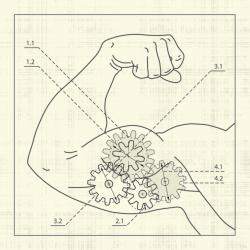It’s commonly known by people in the bodybuilding world that protein is required to build muscle mass. What’s really important to know is that your protein intake amount is adequate enough to feed your hard working muscles. If it’s not, your muscles will not develop well in contrast to the amount of work you’re putting in.
One way to know how much more protein to eat is to first figure out the overall calories you need to be eating for optimal muscle growth.
Building your muscles is much like gaining weight it takes between 300 – 500 calories to put on extra muscle mass or weight. Eating 500 calories extra every day will have you putting on about one extra pound every week. Keep in mind that you must be working your muscles to burn these extra calories so that they don’t end up as stored fat opposed to built muscle mass.
Now, if your plan is to use these extra consumed calories to build your muscles then you’ll want to convert the 300 – 500 calories into mostly protein. You don’t want to be increasing the amount of fat that your ingesting, although some fat is important. Lean cuts of meat will contain some fat, nuts will contain some fat and well designed protein shakes will contain some fat.
So, at any rate, don’t go overboard thinking you have to avoid fat completely. You do want your protein calories to be the bulk of these additional calories that you are consuming in order to accelerate your muscle building venture.
Work Your Muscles Hard but Ensure Proper Protein Intake When You Do.
Learning the concept of consuming the correct protein intake for building muscle is to understand that protein is the foundational building block for gaining muscle mass. With these protein building blocks in your system, when you train your muscles, you are stimulating your muscle growth cycle to develop your muscles at a much faster pace.
So it makes sense to work your muscles really hard but only if you have good amounts of protein in your body to feed those hungry worked muscles.
Why Building Muscle Mass without Proper Protein Intake is a Bad Idea
You may have heard the saying “Turn fat into muscle” and while it is true that when you workout, you’ll be losing fat and as long as you are maintaining a good protein level in your body, you’ll be gaining muscle. But you’re not actually turning muscle into fat.
The bottom line is that if you don’t consume the right amount of protein based on how rigorously you work your muscles, your muscles will not grow no matter how hard you work them. And on the flip side, you never want to over eat if you’re not burning the calories you consume because you will pack on fat pounds and that’s the exact opposite of what you want to achieve.
Many of the weight training professionals will recommend not eating extra on your rest and recover days even if your body and brain are screaming to be fed more food. Instead, they advocate physically resting up more on your rest days. What this habit will do is create an energy surplus in your body without feeding it more.
The benefit is that when you re-engage in performing an intense workout, your body will draw upon this surplus reducing your body fat stores. And as we all know, the less body fat you have surrounding you, the more your magnificent muscle tone shows itself off. Many times, the muscle tone is there… it’s just hiding.
How to Add More Protein to Your Diet
There are no one-size-fits-all answers to how much protein you should add because it can differ greatly from person to person. While one person might want to simply shape up, the next person may be looking at competition bodybuilding. One might want to get their increased protein intake from food, others may want to supplement; others will want to do both.
Increasing Your Protein Intake with Food
Everyone wanting to build up their muscles will have protein requirements unique to them so it’s a good idea to start slower rather than too fast. Keeping in tune with what was said earlier, you’ll want to start out by adding in an extra 300 calories of protein each day that you workout for three months.
Take a step back and see where you are at. If you’re not seeing the muscle growth you were expecting, increase your protein intake to 500 calories and compare notes in three more months. A local bodybuilding coach can help get you on the road to reaching your goals much faster because they can personalize this task for you and your goals.
Increasing Your Protein Intake with Supplements
Most protein choices contain higher amounts of fat and research has shown that low fat protein choices work just as effectively in building muscle. While you can easily add in low fat dairy items, lean meats like chicken, fish and turkey; a good quality protein supplement is a convenient way to “beef up” your protein intake.
There are many protein supplements to choose from; some good, some great and some that are not so good – even downright bad for you sorry to say. The most important thing to glean from this article is to find a way to increase your protein intake when your goal is to build muscles.
Secondly, your goal is most likely to simultaneously lose fat while building up your muscle tone. So, as logic plays out in our search for a good quality protein supplement you will want to look for low fat, low sugar, no artificial ingredients whatsoever; basically you want as pure of protein you can get in the supplement you choose and avoid all the garbage so many manufacturers throw in their products merely for the sake of marketing buzzwords.
Read the labels and like anything you’re thinking about putting in your body, it there’s a word you don’t understand… find out what the heck it is before you consume it!
You can learn more about whole food protein and protein supplements at http://MyFitnessNut.com but the big takeaway for this article is that you must increase your protein intake if you want to increase your muscle mass. You can lift weights from morning until the sun goes down and still not build muscle mass. That would be sad.
Reason; if you don’t feed your muscles protein when they’re being worked, your muscles will tear down and feed upon their very own protein leaving your muscle building goals stuck in the mud. Increase your protein intake to the amount that works for you and you’ll be smiling at the results of your efforts instead of wondering why your workouts aren’t working as well as you like.









